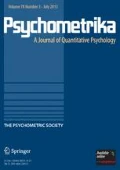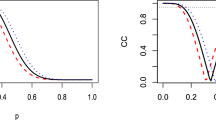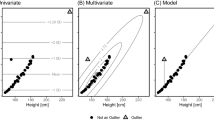Abstract
A concept of approximate minimum rank for a covariance matrix is defined, which contains the (exact) minimum rank as a special case. A computational procedure to evaluate the approximate minimum rank is offered. The procedure yields those proper communalities for which the unexplained common variance, ignored in low-rank factor analysis, is minimized. The procedure also permits a numerical determination of the exact minimum rank of a covariance matrix, within limits of computational accuracy. A set of 180 covariance matrices with known or bounded minimum rank was analyzed. The procedure was successful throughout in recovering the desired rank.
Similar content being viewed by others
References
Bekker, P. A., & de Leeuw, J. (1987). The rank of reduced dispersion matrices.Psychometrika, 52, 125–135.
Bentler, P. M., & Woodward, J. A. (1980). Inequalities among lower bounds to reliability: With applications to test construction and factor analysis.Psychometrika, 45, 249–267.
Della Riccia, G., & Shapiro, A. (1982). Minimum rank and minimum trace of covariance matrices.Psychometrika, 47, 443–448.
Eckart, C., & Young, G. (1936). The approximation of one matrix of another by lower rank.Psychometrika, 1, 211–218.
Shapiro, A. (1982a). Rank-reducibility of a symmetric matrix and sampling theory of minimum trace factor analysis.Psychometrika, 47, 187–199.
Shapiro, A. (1982b). Weighted minimum trace factor analysis.Psychometrika, 47, 243–264.
Takeuchi, K., Yanai, H., & Mukherjee, B. N. (1982).The foundations of multivariate analysis. New Delhi: Wiley.
ten Berge, J. M. F., & Kiers, H. A. L. (1988). Proper communality estimates minimizing the sum of the smallest eigenvalues for a covariance matrix. In M. G. H. Jansen & W. H. van Schuur (Eds.),The many faces of multivariate analysis. Proceedings of the SMABS-88 Conference in Gronigen (pp. 30–37). Groningen: RION.
ten Berge, J. M. F., Snijders, T. A. B., & Zegers, F. E. (1981). Computational aspects of the greatest lower bound to reliability and constrained minimum trace factor analysis.Psychometrika, 46, 201–213.
Author information
Authors and Affiliations
Additional information
The authors are obliged to Paul Bekker for stimulating and helpful comments.
Rights and permissions
About this article
Cite this article
ten Berge, J.M.F., Kiers, H.A.L. A numerical approach to the approximate and the exact minimum rank of a covariance matrix. Psychometrika 56, 309–315 (1991). https://doi.org/10.1007/BF02294464
Received:
Revised:
Issue Date:
DOI: https://doi.org/10.1007/BF02294464




